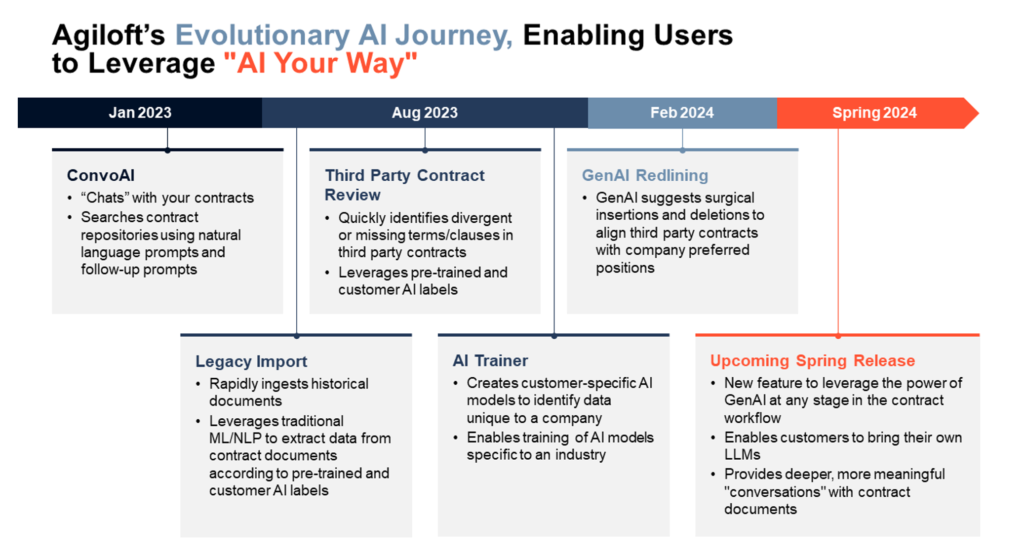
In 2021/22 CLM funding news garnered multiple headlines. Today the buzz is a little quieter, but contract lifecycle management is arguably more relevant for corporates now than ever before, especially with GenAI. Artificial Lawyer caught up with Andy Wishart, CPO at Agiloft, a company that is emblematic of the CLM sector’s journey.
‘Agiloft is growing at a similar rate as before and I’m now in my fourth year there,’ Wishart told this site. ‘We’re also active in the UK and EU.’
The former Thomson Reuters exec and founder of Contract Express noted that even if CLM growth news is not being shouted from the rooftops as it was before, they now have over 300 staff globally, a huge increase on what it was when he joined – all of whom work remotely.
And that has no doubt helped to control their cost base at a time when plenty of legal tech companies that were filled with cash a few years ago realised they’d have to make that money last. Back in 2020 they raised $45m, but have not gone back to the market for another major VC investment.
However, as Wishart noted, they’ve done well without oodles of new cash. He explained that they’ve really expanded their client reach and client profile.
‘If you go back three years we were working a lot in the mid-market. Now we have many large enterprise customers, such as Moderna and Honeywell,’ he added.
(Note: it was interesting to see this week that Moderna has also deployed OpenAI’s LLMs across the business and its inhouse legal team was on a video saying how much they were using it for legal matters – although they didn’t seem to focus on CLM needs.)
Which brings us to GenAI and the development of the company’s tech offering. As you can see from the diagram below, they’ve moved through several key steps all related to AI:
- ConvoAI in Jan 2023 – so you can ‘chat with your contract’
- Then, 3rd Party Contract Review – using pre-trained customer AI labels
- Then in Feb this year, GenAI use expands, and you now can ‘suggest insertions and deletions to contracts’ and offer up preferred positions.

And, the latest step, which is coming very soon, will offer GenAI at ‘every stage of the contract workflow’, ‘allow customers to bring their own LLMs’, and allow ‘deeper conversations’ with contracts – i.e. not just a little chat, but really getting into more subtle insights – which carefully system-prompted LLMs do indeed seem to be very good at.
And this is a journey that several other CLM companies have been on, or are going on. Moving from older NLP machine learning methods, to really pushing the envelope with that tech, to then adopting GenAI and now seeing how much they can offer with it.
Not that they are newbies to GenAI. As Wishart noted they had in the past used a small LLM, RoBerta, that goes back to 2021, which was evolved from BERT, and which Agiloft used for their ‘first version of Q&A search’.
As to what’s happening now, Wishart stated that GenAI is not necessarily doing something wholly new, rather it’s just better at doing some things than older AI methods. For example, redlining and replacing text with preferred language is a very subtle piece of work and GenAI is just more nuanced in what it can do.
‘Up to date LLMs can help with the last mile of understanding,’ he observed, and that’s a nice way of putting it.
The older ML/NLP systems were great at many things, but super-agile language understanding that’s good enough for automated editing of legal text…they’re not quite so good.
We then explored chunking vs not chunking, letting the users freely prompt vs having most of that already handled on the backend.
As to prompting, he was open to change, but noted that ‘prompting is the interface today’ and added that there is something quite positive about being able to use your own prompts.
As to accuracy, he said that they don’t publish accuracy and precision scores, but stressed ‘it’s high!’.
And humans in the loop? We will ‘never take humans out of any legal workflow’ he concluded.
Overall, Wishart is optimistic about Agiloft’s continued growth and it’s heartening to hear him say that he really senses that ‘innovation is happening more broadly among clients’, and that GenAI is acting as ‘a significant accelerant’.
This last bit about client enthusiasm is central not just to CLM use, but legal tech’s future. No matter what the law firms do, if the clients don’t want to do things differently then any positives from GenAI will be meagre in terms of results.
So, the Agiloft journey is a triple positive – good for them, a positive sign for CLM adoption more generally, and an indication that the clients, i.e. the people who keep the entire legal sector alive, are more open to rethinking how things are done.
Wishart wraps things up by saying: ‘I studied AI and psychology at university and my parents didn’t see how that would be useful. Now, 30 years later we can see it’s useful.’
And that is very true.